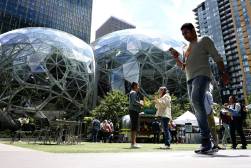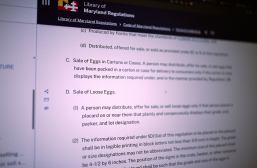Seattle builds ‘playbook’ to guide open data efforts

Just over six months after Seattle Mayor Ed Murray established a new open data policy, the city is rolling out an “open data playbook” to help guide staffers as they organize their information and work to post it online.
The city’s IT department spent the last few months working to refine the new playbook following Murray’s February executive order to establish an “open by preference” policy for Seattle’s agencies, and formally posted the new document online for all to see late last month.
The playbook contains details on how to handle certain types of data, clear steps for how to manage the process of posting data sets to the city’s open data portal and even a list of open data resources for workers to consult moving forward.
Jim Loter, the department’s director of digital engagement, told StateScoop the document is a key way for his team to get city agencies engaged with the program, kicking off a “highly collaborative” process of shaping Seattle’s open data practices.
“We see the playbook as an evolving document where, as we confront and grapple with trying to manage this program, the playbook becomes this repository for lessons learned,” Loter said.
Though Loter started working for the city just two days before Murray signed his February order, he said he quickly realized the need to start developing some sort of roadmap to help agencies implement the mayor’s open data plans. But he also appreciated that he’d need some input from Seattle staffers to get that process started.
“We knew it wasn’t going to be successful unless we had active participation from virtually every city department, because they know the business,” Loter said. “They know their data, they know their constituents and they know what data is most valuable to release.”
Specifically, the new policy directed each department to name an “open data champion” to lead their efforts, and Loter said it made perfect sense to start engaging with that community.
“We started with the questions of, ‘What do you need to know, what guidance do you need from us to think about data in an open data way instead of just an internal enterprise data way?” Loter said. “The playbook was an attempt to answer those questions and serve as a very clear, step-by-step instruction set for how do you prioritize your data sets, how do you even know what you have and think about inventorying in an open data way.”
He noted that the city’s started hosting a monthly “breakfast of champions” for those open data leaders, giving the IT department a chance to ply them with coffee and donuts, but also collect valuable thoughts on how their data sharing efforts are proceeding.
Yet as he worked to build a “feedback loop” and craft the city’s next steps on its open data journey, Loter said he also wanted to start hearing from sources “external to the city through the civic tech community.”
He worked with Candace Faber, the city’s civic technology advocate, to start getting feedback on the playbook from an external perspective, and even held meetings with the Sunlight Foundation — the group that also helped them craft the new open data policy — and other organizations “tied into the open data ecosystem.”
“We recognize that other people have probably figured out stuff that we were sitting around and banging our heads on the desks about,” Loter said. “We didn’t necessarily want to be completely opportunistic and say, ‘Hey, we have this problem, tell us how to solve it,’ but we recognized that we probably have learnings too that can benefit others and there’s value in establishing relationships.”
Loter added that they also worked with the research firm Gartner, leading them to consider one issue that could’ve easily flown under the radar otherwise.
“I remember one conversation with the Gartner group, and they’re very enterprise-based, and we were talking with them about data quality,” Loter said. “How do you assess data quality? How do you develop a data quality methodology for open data? And they trotted out their standard tool sets, but I think, along with us at the same point, they came to realize ‘Oh wait, open data kind of makes all of this much more difficult, because you don’t have those solid baselines to establish or measure quality against.’ So we recognized that this is really new territory that, if we’re going to develop an open data quality methodology, we have to kind of start from scratch and that needs to be part of the playbook.”
[Read more: Seattle sets concrete steps to bridge digital divide with new action plan]
With all this feedback in hand, Loter said they released the first version of the new playbook to its champions in June. Yet they heard one key complaint — it was way too long.
“It was very much that phenomenon where the first iteration was just a brain dump where everybody who had been involved in this program from the beginning, we explained everything, we went into detail about why certain things were this way and it was very comprehensive, but it didn’t serve its purpose as a playbook or set of documentation that people can pick up and dive in and use,” Loter said. “So we went back and literally in a two-hour session with a virtual red pen, we just excised 50 percent of the content of that document. “
They debuted the new, slimmed down version of the playbook to employees in July before posting it publicly. Yet Loter hopes to continue pulling in more input over the next few months, since he views it as a “living document.”
“I think if you crack open the playbook in a couple of weeks, it’s going to be slightly different than it is today, and that’s all part of the plan,” Loter said. “Internally, it’s posted to an environment where everybody can edit and add comments to it. We hope to do that with the civic tech community and actually publish it to a platform like GitHub where it can grow and evolve and become part of the conversation.”
Loter’s even hoping that, as more workers engage with the playbook, they start reaching out on their own to engage with the resources featured in the document.
“We don’t want to be the only ones who have the relationship with, say, the Sunlight Foundation, the only ones who have a relationship with the Future of Privacy Forum,” Loter said. “We don’t want to be the gatekeepers. We don’t have any kind of proprietary ownership over the knowledge of how you run an open data program, you really want that to be distributed throughout the champions.”
But he noted that the IT department will hardly be sitting on its hands in the coming months as it continues to iterate on its open data practices. In particular, Loter is planning to engage more with the city’s network of public libraries, since he believes that “21st century librarians are information scientists.”
“Sure, they can help you find a good book to read, but they can also help you find data, show you how to work with data, they’ve been doing that for years,” Loter said. “We see the public library connection as a critical public engagement component to help us connect with people who aren’t engaged with that civic tech community, who are just your average user trying to figure out, ‘Is crime really going up in my neighborhood?’ or ‘Is construction in Seattle really creating traffic problems?’”
As Loter and his team makes inroads in that community as well, he foresees the playbook, and open data program as a whole, continuing to evolve.
“The feedback we collect from those engagements is going to drive the further, more strategic build outs of the datasets that we’re publishing,” Loter said.






